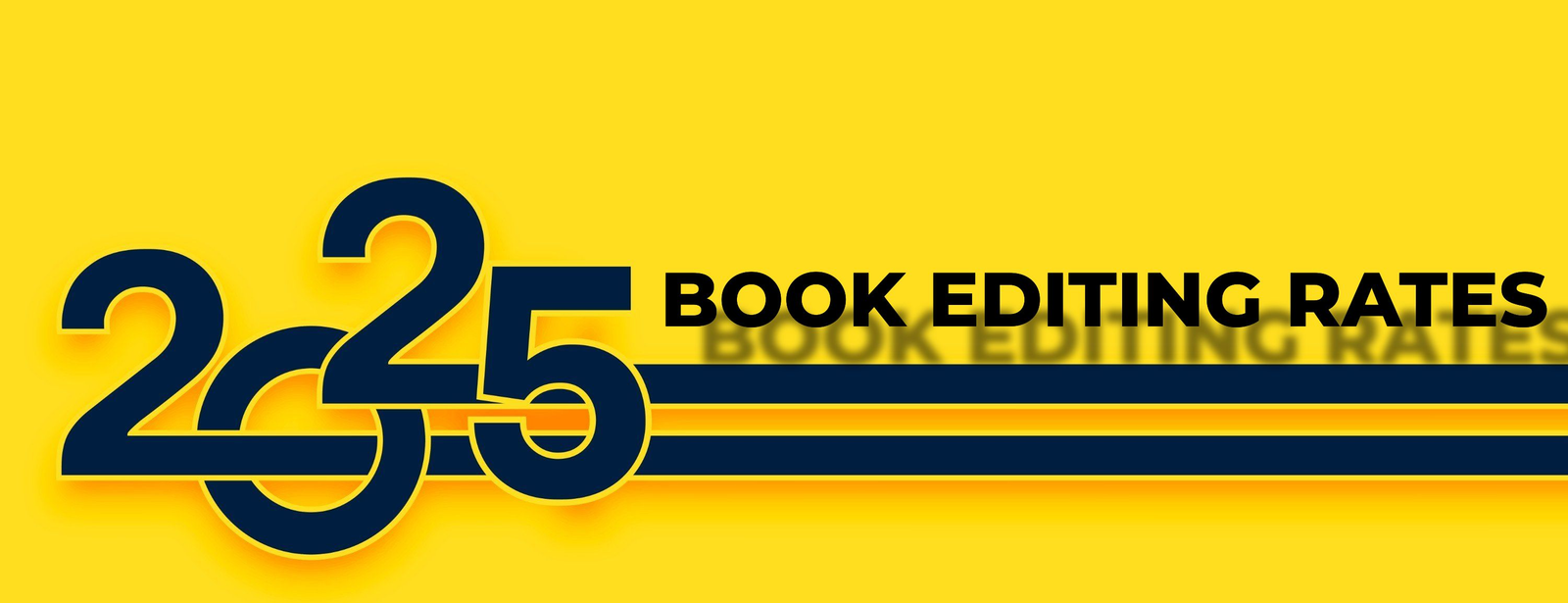
How Much to Charge for Editing a Book in 2025?
Have you finished writing your book and are now wondering how much it will cost to get it edited? Creating a book is a process that requires dedication and expertise from dedicated professionals at various stages of production. Editors play a vital role in reviewing manuscript drafts, providing constructive feedback, and refining the content to bring out the best version of the story.
With the rise of self-publishing and numerous aspiring writers entering the industry each year, figuring out the price of editing can seem like a bit of a mystery. There are different types of edits, editor experience levels, and pricing methods to consider. Not to worry, though. For book editing in 2025, prices generally vary depending on the level of editing required.
This blog will explore the various factors that determine an editor's rate and provide some guidelines on how to approach pricing.
Understanding Different Types of Editing
There are generally four main categories of editing performed on book manuscripts. It's crucial for both editors and authors to understand the distinctions between them as it directly relates to determining appropriate charges for editing a book.
Developmental Editing
Developmental editing includes a high-level charge because of the manuscript's plot, characters, pacing, and flow of ideas. Editors provide a comprehensive report highlighting any issues with the overall organization, content, or direction of the story.
Average developmental editing charges generally range from $0.05 to $0.10 per word since this requires assessing the manuscript as a whole and recommending major revisions to fundamental aspects. Given the intensive focus and time commitment, developmental editing services regularly cost the most compared to other types.
Line Editing
With a line edit, the focus shifts to language, style, and readability at the sentence level. An editor will scrutinize word choices, grammar, syntax, and flow throughout the manuscript. Pricing for line editing a book fluctuates more than developmental work, estimated typically between $0.04 to $0.08 per word. Since line editing entails a close examination of sentence-level writing, it requires substantial effort and deserves competitive remuneration.
Copy Editing
Copy editing mostly works on cleaning up the remaining grammatical errors, inconsistencies, and punctuation issues and conforming to style guides following developmental and line edits. Typical charges for book copy editing range from $0.02 to $0.05 per word. At this stage, the overall writing should be solidified, allowing the copy editor to efficiently polish the finer textual details. Pricing reflects the high standards and precision needed.
Proofreading
As the final stage of review, proofreading focuses on one last sweep for typos or other minor mistakes prior to publication. Proofreading rates tend to be on the lower end, estimated at $0.01 to $0.03 per word. While still important for catching any slip-ups, proofreading involves less intensive editing compared to earlier rounds. Rates are structured accordingly but remain worthwhile to catch anything missed earlier.
Factors That Influence Your Book Editing Rates
Several variables affect how editors set competitive yet profitable rates for book editing projects. Considerations include the following:
Type of Manuscript
Fiction vs Non-fiction
Non-fiction manuscripts commonly demand higher book editing charges than fiction manuscripts. Non-fiction works tend to be more information-dense and research-focused, requiring editors to verify factual details. Complex subjects, academic editing for style adherence, and ensuring consistency magnify word counts as well. Average non-fiction charges regularly exceed fiction rates.
Genre
Dense, complex genres like literary fiction, academic textbooks, or intensive series can reasonably incur premium editing fees. Lighter styles suitable for young readers may lessen word count workloads, balancing out rates. Technical formats pose challenges that merit appropriate remuneration.
Complexity
Manuscripts replete with complicated world-building, detailed research, or intricate citation systems naturally warrant larger investments from capable editors. Subjects steeped in jargon or highly specified terminology similarly increase editing demands. Fair pricing acknowledges these variable factors.
Word Count
Given editor charges are most frequently calculated per word, discerning exact word counts avoids misunderstandings. Editors prefer setting book editing rates according to objective word count standards versus subjective page estimates. Common editing industry rates cite around $0.01 to $0.03 per word for standard fiction and non-fiction works.
Editor Methods of Pricing
Hourly rate
Hourly fees offer flexibility yet obscure workload specifics. Setting estimate rates between $30-50 per hour accommodates experience levels for standard book editing.
Per word rate
Itemizing work in cents per word provides transparent quantification. Rates around $0.01-0.05 per word suit entry-level through experienced editors, respectively.
Per page rate
Industry convention styles 250 words per page. Page estimated rates of $5-15 fairly compensate for average projects.
Project/flat fee
Flat quotes encapsulate scope and establish clear budgets, though quality variations remain possible. Competitive quotes factor in timeframe, complexity, and editor background.
Book Complexity
Technical non-fiction or scholarly subjects entail supplementary verification processes that merit premium hourly or per-word charges for book editing. Unusual formatting, intricate layouts, or unusual composition techniques also justify elevated costs. Complex projects require especially devoted guidance that affirms such investments.
For a 60,000-word book, copyediting might range from $1,200 to $3,000, while developmental editing could range from $3,000 to $6,000. Prices can fluctuate based on the editor's experience and the scope of work needed.
Additional Costs to Consider
Beyond direct compensation rates, editors must account for supplementary business expenses, which ultimately impact price points offered to clients
Software and Tools
Essential editing applications and book production programs necessitate periodic license renewals averaging an estimated $100-300 annually. Cloud-based services entail an estimated $10-30 monthly subscriptions.
Taxes and Fees
Freelancing requires quarterly income tax estimations and annual filings, potentially recruiting certified public accountants. Payment platforms levy 5-15% processing fees on exchanged funds. Incorporating tax compliance and modern convenience charges maintains prudent financial planning.
Administrative Time
Beyond editing hours, 30-50% of work time involves client relations - proposal drafting, consultations, record keeping, and contractual compliance. Building projects and general administrative requirements demand compensation. Calculating full-time investments informs equitable self-evaluation.
How to Communicate Your Book Editing Rates to Clients?
Transparent communication cultivates professional partnerships with author-clients. Shared understandings cement productive working relationships and outcomes.
Building Transparency in Your Pricing
Clearly outlining proposal components - specific editing levels, estimated completion schedules, sample markup approaches - sets realistic expectations. Accounting for likely question areas preemptively assuages later concerns.
Providing Detailed Quotes
Listing quoted fees according to adjustable factors personalizes pricing. Breaking down word count distributions across each editing stage shows labor investments transparently. Presenting options that fit diverse budgets builds inclusiveness and confidence.
Handling Negotiations and Price Objections
Acknowledging budget priorities respectfully, editors at Grand Publishers may propose reduced services or installment payments. Yet demanding unreasonable reductions risks quality or profitability. Withdrawing professionally safeguards reputations when compromise proves untenable. Fair policies standardize practices and protect industry standards.
Conclusion
While calculating how much to charge for editing a book in 2025 takes a bit of homework, focusing first on your priorities and requirements will help narrow the options. Consider your timeline, budget, and how advanced or complex your manuscript is. Then, factor in editor attributes such as experience level, specializations, and turnaround times.
Compare sample quotes using common metrics like cost per word. Remember that investing in a skillful editor provides value that extends beyond just manuscript improvements. A seasoned guide can help refine your writing skills for future projects as well. With a thoughtful selection process and open communication, the right editorial fit is within reach.
Contact Grand Publishers Co. to get your book edited at reasonable rates.




